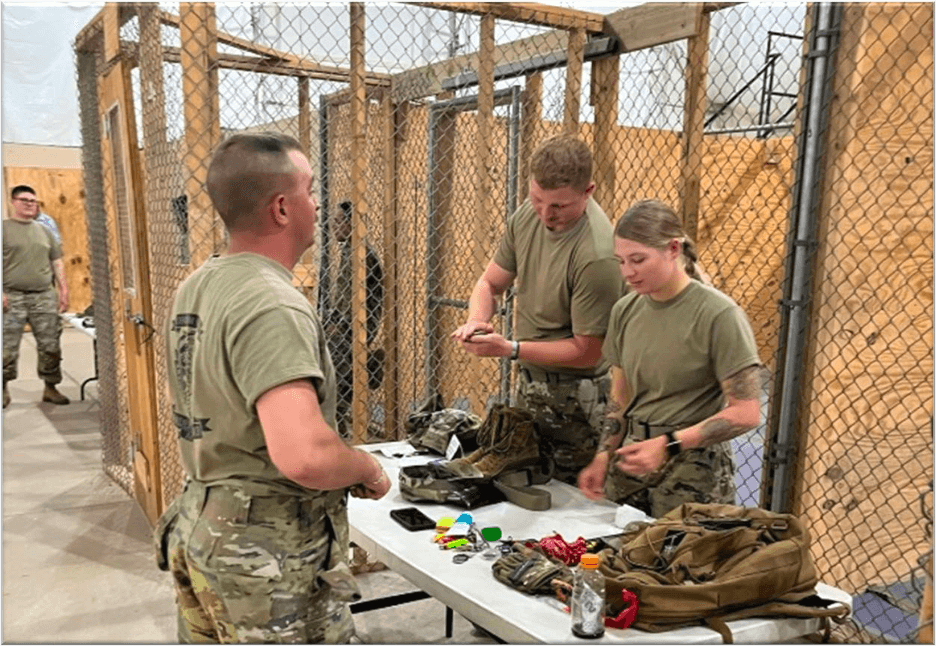More than 150 Tennessee soldiers – several with civilian law enforcement experience – are in Kuwait to provide customs support.
The Tennessee National Guard’s 267th Military Police Company is in the initial months of its yearlong deployment to the Middle East.
Generally speaking, the 267th is helping to expedite the redeployment of United States military personnel, Department of Defense contractors and equipment from the Central Command’s (CENTCOM) jurisdiction to the customs territory of the United States.
The micro-function of the company is assisting in the inspection of containers, plus wash rack and terminal operations.
“Our goal is to eliminate the introduction of agricultural hazards, various diseases and the flow of illegal drugs and contraband from the USCENTCOM area of responsibility into the United States through the Department of Defense and Department of Defense contracted transportation,” Capt. Cristian Johnson, of the 267th MP Co., told Reserve + National Guard Magazine via email.
RELATED: Cyber warfare prompts deployment for Maine guardsmen
1st Sgt. Leigh Ann Hester is part of Johnson’s team. The 20-year military police officer and 17-year civilian police officer — the last six as a detective — is the company’s search and seizure specialist, along with possessing an interview techniques skill set. She said several of the deployed soldiers are police officers and have prior customs mission experience.
“Many of our soldiers are also civilian police officers and we also have several who volunteered from different units that conducted this same mission almost 10 years ago with the 252nd MP Co. from Cleveland, Tennessee,” Hester said in an email.
The 267th soldiers are under the purview of Defense Travel Regulation and USCENTCOM policies that outline their standard operating procedures, ensuring a high level of protection.
The MP company assembled at Fort Bliss, Texas, in May for mission pre-deployment training. Johnson prepared his company through three annual trainings to better understand the standards for customs, and the soldiers honed their searching tactics and techniques originally used for detainee operations.
“As my team and I prepared for this mission, we read through the Defense Travel regulations and made sure we had a clear understanding on the ‘what to do and what not to do,’” he said. “We absorbed the customs search process; emphasizing that we may be looking for hazards and potential contraband, however, we were still searching our own friendly forces and civilians.”
Johnson himself is a former civilian law enforcement officer, who trains the team in searches of bags, personnel and equipment. And he imparts a bit of psychology, or behavioral science, as well.
“I also emphasized the need to read people’s demeanor as it changes when they are either hiding something or know they have done something wrong,” he said.
Though the straightforwardness of preparation and expertise helps, deployment into duty live-action is presenting its challenges.
“We were trained in a controlled environment; however, training, and actual missions don’t always answer all the questions,” Johnson said. “Although the unit and I have studied the necessary regulations, what we lacked coming in was the hands-on experience in conducting actual customs inspections.”
He further noted that communications have been an obstacle, but the company is weathering the challenge. Johnson said that phone communication with team members conducting operations in certain air or sea ports of debarkation has been an issue.
“We have to make sure that the teams conducting these operations are knowledgeable and can make command decisions on my behalf,” he said. “So far, they have been phenomenal.”
Hester said learning the policies/regulations is another hurdle that has to be cleared, noting that the job is technical and nuance-heavy.
“The biggest challenges is to learn all the regulations so we have a clear understanding of what our left and right limits are as well as keeping cargo and equipment from becoming frustrated at the ports of entry,” she said.
But like Johnson, Hester said the team is capable.
“I’m definitely proud of our soldiers as they have trained hard and stayed flexible in an ever-changing, ever-evolving mission.”

